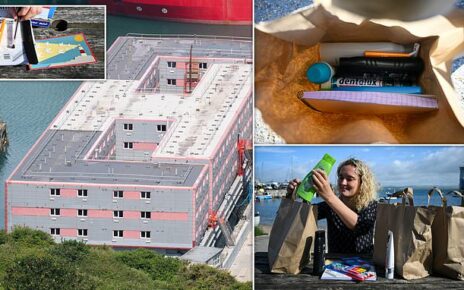United Nations: Russia’s invasion of Ukraine and a global food crisis aggravated by the war will be the focus of world leaders when they convene at the United Nations in New York this week, a gathering that is unlikely to yield any progress towards ending the conflict.
“It would be naive to think that we are close to the possibility of a peace deal,” said UN Secretary-General Antonio Guterres ahead of the high-level meeting of the 193-member UN General Assembly, which starts on Tuesday. “The chances of a peace deal are minimal, at the present moment.”
Volunteers collect food to send in support of people left homeless during the fighting near the Kyrgyz-Tajik border Bishkek, Kyrgyzstan on Saturday, September 17.Credit:AP
Geopolitical divides, hardened by the seven-month-old war, are likely to be on full display as the United States and Western allies compete with Russia for diplomatic influence.
US Ambassador to the United Nations, Linda Thomas-Greenfield, said: “other countries have expressed the concern that … as we focus on Ukraine, we are not paying attention to what is happening in other crises around the world”.
“That is not the case,” she told reporters, adding that while Ukraine will feature next week “it will not be the only thing that we’re dealing with.”
UN Secretary-General Antonio Guterres at a joint press conference with Pakistani Foreign Minister Bilawal Bhutto Zardari on September 9.Credit:AP
Guterres said the geopolitical rifts were “the widest they have been since at least the Cold War”. He warned they “are paralysing the global response to the dramatic challenges we face”, citing war, climate, poverty, hunger and inequality.
Russia and Ukraine are major grain and fertiliser exporters and the United Nations has blamed the war for worsening the food crisis that was already fuelled by climate change and the COVID-19 pandemic.
The United States is due to co-host a food security summit with the European Union and the African Union on the sidelines of the UN gathering, along with a COVID-19 global action plan ministerial meeting and a replenishment conference for the Global Fund to Fight AIDS, Tuberculosis and Malaria.
“Underlying a lot of these meetings will be a huge amount of tension between Western countries and representatives of the global south in particular,” said Richard Gowan, UN director at the International Crisis Group.
“There’s still a lot of ill feeling over issues such as the COVID vaccine rollout, climate financing … and now food prices. All these issues are driving major wedges amongst UN member states,” Gowan said.
Russia has been trying to chip away at its international isolation after nearly three-quarters of the General Assembly voted to reprimand Moscow and demand it withdraw its troops within a week of its February 24 invasion of neighbouring Ukraine.
Russian Foreign Minister Sergei Lavrov, his US counterpart Antony Blinken and French President Emmanuel Macron all visited African states in the past several months, vying for influence. Africa has been hard hit with a famine expected to be declared in Somalia in the coming months.
Macron intends to use his two-day visit to New York to lobby countries that have remained neutral in the war to try and bring them onside with the West, French officials said, with a focus on India, Gulf countries, Africa and some Latin American states.
“What we need is peace in Europe, a turning away from great power confrontation and its endangerment of global security, and the shaping of a fairer and more responsive multilateral order,” Kenya’s UN Ambassador Martin Kimani said. “That’s where they need to pay attention, as do we all.”
Russia’s strategic partner China has been firmly on the fence, criticising Western sanctions against Russia but stopping short of endorsing or assisting in the military campaign. In a surprise acknowledgment, Russian President Vladimir Putin on Thursday said China’s leader Xi Jinping had concerns about Ukraine.
For the past two years leaders were allowed to submit video statements because of pandemic restrictions, but this year they have to travel to New York to speak in the General Assembly chamber. Putin and Xi are sending their foreign ministers.
However, the General Assembly agreed on Friday to allow Ukrainian President Volodymyr Zelensky to send a pre-recorded video statement. The decision was adopted with 101 votes in favour, seven against and 19 abstentions.
Ukrainian Foreign Minister Dmytro Kuleba is expected to attend. He will attend a UN Security Council ministerial meeting on Thursday in Ukraine, along with Blinken, Lavrov and China’s Foreign Minister, Wang Yi.
The US president is traditionally the second leader to address the General Assembly, but Joe Biden will this year speak on Wednesday – his appearance delayed because he is travelling to London for Queen Elizabeth II’s funeral on Monday.
Russian Foreign Ministry spokeswoman Maria Zakharova said that so far Lavrov had received requests for about 20 meetings with other leaders.
She told reporters in Moscow that Russia would advocate for “the strengthening of the UN’s central co-ordinating role in world affairs and strict observance of its charter, including the principles of the sovereign equality of states and non-interference in their internal affairs”.
Iranian President Ebrahim Raisi is also travelling to New York. While it is unlikely Tehran and Washington will overcome an impasse to salvage a 2015 nuclear pact soon, Iran will use the gathering to keep the diplomatic ball rolling by repeating its willingness to reach a sustainable deal.
While Ukraine will dominate the week-long UN event, the climate crisis will also garner attention. But many other global crises are likely to take a back seat, like the loss of Afghan women’s rights since the Taliban came to power 13 months ago.
Afghan lawmaker Naheed Farid urged world leaders to “name the regime of Afghanistan as a gender apartheid,” telling reporters in New York: “This language was a catalyst to change in South Africa and can be a catalyst to change in Afghanistan.”
Reuters
Get a note directly from our foreign correspondents on what’s making headlines around the world. Sign up for the weekly What in the World newsletter here.
Most Viewed in World
From our partners
Source: Read Full Article



